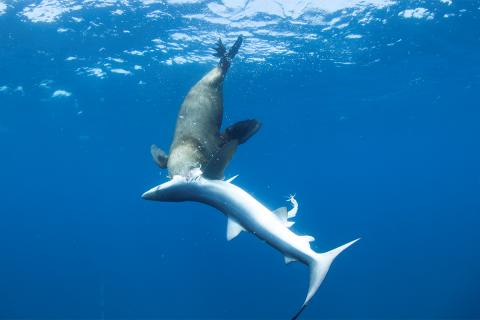Тюленей обвинили в охоте и поедании акул

http://www.newscientist.com/article/dn27236-killer-seals-develop-a-taste...
It's like Jaws but, this time, the shark is on the menu. In an incident that turns the phrase "shark attack" on its head, a seal has repeatedly attacked, killed and partially devoured medium-sized sharks. If this turnabout proves common, ecologists may need to reassess the role of seals in marine ecosystems.
More than a decade ago, Chris Fallows, a dive-boat operator based in Cape Town, South Africa, happened to see a young Cape fur seal chasing, tossing and eventually killing a blue shark. The seal then ate the shark's internal organs, which are the most energy-rich part of a shark's body.
Then, in 2012, it happened again. This time, Fallows was underwater photographing 10 blue sharks when a young male Cape fur seal arrived and proceeded to chase and kill five of the sharks, once again eating only their guts.
He has now published a study on this discovery with his colleagues.
Ordinarily, both seals and blue sharks, which are roughly the same size, prey on much smaller fish, squid and other marine life. Several species of seal are also known to feed on smaller sharks, and blue sharks have been seen pursuing – but not catching – fur seals. Fallows's observations are the first time anyone has seen seals preying on such large sharks, says Hugues Benoit of the Canadian Department of Fisheries and Oceans in Moncton, New Brunswick, another of the study's authors.
Other marine mammal researchers are surprised that a seal would take on such a large, toothy challenge. "You don't want your meal to come bite you in the ass, and the shark has some potential to cause serious harm," says Dominic Tollit of SMRU Canada, a marine mammal consultancy group based in Vancouver. "Would you attack a lion if you're hungry, or would you go for something smaller?"
No one knows how commonly seals turn the tables on sharks in this way. However, Benoit suspects that it could be far more common than anyone realises – especially if most cases take place well out to sea, far from most researchers' eyes. And, if seals typically eat only the sharks' guts, their stomach contents and faeces will contain few hard parts to testify to their sharky dinners.
By chowing down on their competitors, seals could be altering ocean food webs in unexpected ways, he says, especially with seal populations booming throughout the oceans. If seals help hold down shark populations, for example, that could have a net benefit on populations of smaller fish, even if the seals also eat the same fish themselves. If so, fisheries biologists may need to take that into account in managing fish populations.
Journal reference: African Journal of Marine Science, DOI: 10.2989/1814232X.2015.1013058
Тюлени все чаще нападают на равных им по размеру акул, убивают их и съедают внутренности. Случаи смены ролей охотников и жертв в морских экосистемах вынуждают ученых пересмотреть свою точку зрения на экологию океанов, сообщает New Scientist со ссылкой на журнал African Journal of Marine Science
Больше десяти лет назад Крис Фаллоуз (Chris Fallows), капитан моторного судна из Кейптауна, заметил, как молодой капский морской котик гнался за синей акулой, толкал ее и через некоторое время загрыз, съев внутренние органы животного (наиболее богатые питательными веществами). В 2012 году Фаллоуз фотографировал синих акул под водой, когда к стае подплыл капский морской котик, загрыз пять акул и также съел их внутренности.
В своей научной статье Фаллоуз пишет, что в норме эти животные, примерно равные по размерам, охотятся на мелких рыб и кальмаров. Некоторые виды тюленей нападают на мелких акул, а синие акулы иногда гоняются за дельфинами. Однако впервые ученые стали свидетелями атаки морских котиков на настолько крупных акул, и они затрудняются объяснить, зачем морским млекопитающим преследовать такую опасную добычу.
В заключение биологи отмечают, что агрессивное поведение тюленей может сдерживать рост популяций акул и, таким образом, помогать другим рыбам — в том числе видам, имеющим важное значение для рыболовецкой отрасли.
Недавно тюленей также обвинили в жестоком убийстве сотен тупомордых дельфинов, чьи изуродованные трупы в большом количестве море выбрасывает на побережье Нидерландов. Зоологи предполагают, что ластоногие убивают дельфинов ради развлечения.
- Войдите чтобы оставить комментарии
